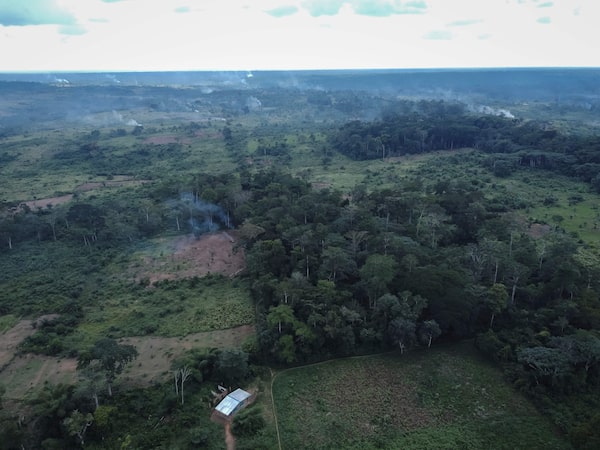
A deforested farm in Yangambi, 100 km from the town of Kisangani in the Democratic Republic of the Congo. Congo Basin forests and peatlands, covering 200 million hectares across six African countries, are considered crucial to the climate, but they suffered an alarming 5-per-cent increase in its rate of deforestation last year.GUERCHOM NDEBO/AFP/Getty Images
Global efforts to protect Africa’s rainforests have failed to halt the rapid destruction of one of the world’s last intact tropical forests, a new study has found.
The Congo Basin, second only to the Amazon in the size of its tropical rainforest, suffered an alarming 5-per-cent increase in its rate of deforestation last year, according to the study by Climate Focus, a Netherlands-based advisory firm.
Global leaders have repeatedly signed pledges and promised money to protect and expand the forests in the Congo Basin, but the promises have achieved little on the ground so far, the study warned.
A separate report on Thursday found that 35 per cent of the Congo Basin was covered by more than 150 oil and gas exploration and production blocks, posing another major threat to the rainforests.
The second study was conducted by Rainforest Foundation UK in collaboration with California-based mapping company Earth InSight. Both reports were released at COP27, the annual United Nations climate conference, held in Egypt this year.
Curb deforestation or you won’t hit net-zero targets, UN group tells firms
The Congo Basin forests and peatlands, covering 200 million hectares across six African countries, are considered crucial to the climate because they are a vast carbon sink, helping to cool the planet by absorbing more carbon than even the Amazon region.
They are also home to millions of Indigenous people and other communities, and they are a huge source of biodiversity. One of every five species on the planet can be found in the Congo Basin, experts say.
“The Congo Basin Forest is at a crossroads,” said Marion Ferrat, a Climate Focus senior consultant and lead author of the deforestation report, in a statement on Thursday.
“Deforestation has been low compared to other tropical regions, but we are seeing an upward trend of fragmentation and forest loss since 2020,” Dr. Ferrat said.
“If this trend continues, we risk losing the largest remaining intact forest in the tropics, along with its immense and irreplaceable value for biodiversity, climate and people.”
The biggest factor in the deforestation is subsistence agriculture by small farmers – but this usually happens after forests are fragmented by new roads for industrial mining, logging and commercial farming, which can open up previously inaccessible areas for smaller farms, the report said.
Often this is because the traditional inhabitants of the forests have no security of tenure, and their customary rights are pushed aside, it said.
Two countries in the Congo Basin region – Gabon and the Republic of Congo – were able to reduce their rate of deforestation last year. But the rate increased in the other four countries, including a dramatic rise of 71 per cent in the Central African Republic and 28 per cent in Cameroon.
A year ago, at the last annual UN climate conference in Glasgow, 145 governments signed a pledge to halt and reverse deforestation by 2030. All six of the Congo Basin governments were among the signatories. But the new report makes it clear that the region is falling behind on the progress it would need to meet this target.
A year ago, at Glasgow, 12 donor countries and the Bezos Earth Fund promised US$1.5-billion over five years to help protect the Congo Basin. “One year later, it remains unclear whether this funding is additional to previous funding allocated to the region, who would receive these funds, and how much of this funding has already been disbursed,” the report said.
It estimated that US$100-billion will be needed annually to protect the Congo Basin forests.
Oil and gas exploration could be another danger to the rainforests. The biggest country in the region, the Democratic Republic of the Congo (DRC), announced in July that it will auction the rights to 30 oil and gas blocks, nearly twice as many as it had previously planned to offer.
Many of the blocks overlap with the Congo Basin and with wildlife reserves in other parts of the country. The DRC is believed to have substantial oil reserves and its government is keen to develop the sector to create jobs and revenue, but the auction plan has provoked anxiety and criticism from environmentalists.
The study by the Rainforest Foundation and the mapping company found that the amount of land allocated to oil and gas activity in Africa is expected to quadruple in the coming years, potentially affecting 30 per cent of the continent’s tropical forests.
“Oil and gas development is often a gateway to deforestation,” the study said.
“In addition to the immediate threats to forests and the climate, the indirect and cumulative impact in terms of the required roads, drilling equipment, pipelines, rigs, processing plants and use of local water sources are still higher. This infrastructure would in turn open up previously intact forest areas to a cascade of deforestation as loggers, settlers and poachers move in.”
 Geoffrey York
Geoffrey York